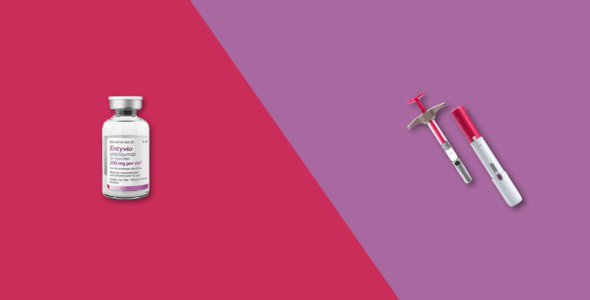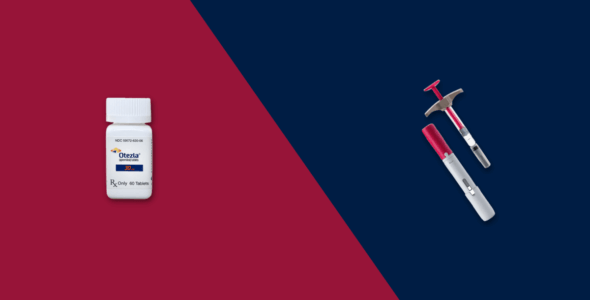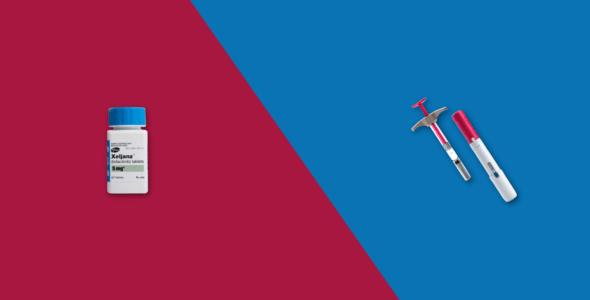Humira side effects and how to avoid them
Table of contents
Humira is a biologic medication used to treat autoimmune diseases like rheumatoid arthritis and similar inflammatory diseases like Crohn’s disease. Humira can cause adverse reactions ranging from joint pain to reactivation of hepatitis B. Learn more about Humira’s side effects and how to avoid them.
What is Humira?
Humira (adalimumab) is an injectable prescription drug manufactured by AbbVie. It is FDA-approved to treat autoimmune conditions like rheumatoid arthritis, Crohn’s disease, and psoriasis. This medicine belongs to a class of biologic medications known as tumor necrosis factor (TNF) blockers.
TNF is a protein in the body that can cause inflammation. Normally excess TNF in the blood is naturally controlled. But in people with certain immune conditions, TNF levels are higher, leading to excessive inflammation. Inflammation is harmful to your body when it is out of control as it can cause severe pain and swelling.
Humira causes a reaction in your immune system by binding to TNF and preventing it from triggering the inflammatory reaction. Other TNF blockers that are FDA-approved include:
What is Humira used for?
Humira can be used used to treat:
- Rheumatoid arthritis
- Ankylosing spondylitis
- Crohn’s disease
- Ulcerative colitis
- Plaque psoriasis
- Polyarticular juvenile idiopathic arthritis
- Psoriatic arthritis
- Hidradenitis suppurativa
- Uveitis
Humira can be used alone or with methotrexate.
How to take Humira?
You take your dose of Humira by injecting it under your skin as a subcutaneous injection, using either a prefilled syringe or an injectable pen. Don’t try to inject Humira yourself until you’ve been shown how to inject it and you’re confident you understand how to do it properly.
If you are being treated with Humira and you need to travel, it can be stored at room temperature, up to a maximum of 77°F (25°C), for up to 14 days (while protected from light).
Get your Humira medication for only $49 per month
Get StartedSide effects of Humira
Humira is an effective treatment but like all prescription medications, it can cause side effects. Read the medication guide that comes with Humira and consult a healthcare professional for further medical advice.
People may experience the following common side effects of Humira:
- Injection site reactions such as bruising or itching
- Joint pain
- Weight loss
- Shortness of breath
- Upper respiratory infections e.g. sinus pain
- Coughing
- Diarrhea
- Fatigue
- Stomach upset
Examples of the most serious side effects relating to taking Humira include:
- Liver damage/liver problems – yellowing of the eyes or skin, right-sided abdominal pain, vomiting, and fatigue
- Nervous system problems such as multiple sclerosis or Guillain-Barre syndrome with symptoms such as numbness and tingling in your hands and feet, vision changes, and dizziness
- Allergic reactions ranging from having trouble breathing to hives
- Immune system changes such as lupus-like syndrome to symptoms such as joint pain, skin rash, chest pain, or shortness of breath
- Increased risks for infections – these include sepsis, tuberculosis, and other opportunistic infections due to viral, bacterial, or fungal infections
- Increased risk of cancer, particularly lymphoma (cancers of the white blood cells) and skin cancer
- Reactivation of a hepatitis B infection in people who carry the hepatitis B virus
- Heart failure or worsening heart failure
How to avoid Humira side effects?
1. Discuss medical history and medications
Due to the possibility of serious side effects, you should discuss with your doctor if you:
- Have previously had cancer
- Have an infection, or a condition that makes it easier for you to get infections
- Have infections that keep coming back
- Have had mild heart failure, or another serious heart condition
- Have a demyelinating disease, like multiple sclerosis
- Have hepatitis B virus (HBV)
- Are about to have surgery or a dental procedure
- Are about to have a vaccination
- Are over 65, as Humira can make it more likely you’ll get infections
- Are pregnant or are planning to get pregnant
- Are breastfeeding or are planning to breastfeed
You should always inform your pharmacist or healthcare professional about prescription medications and other medications you take including over-the-counter meds and supplements to prevent any drug interactions.
2. Rotate your injection site
The importance of rotating insulin injection sites is to maintain effective drug absorption. Small fatty lumps or hard lumps could develop in areas that are continuously used as injection sites. These can interfere with drug absorption and also cause discomfort. Rotate between injecting sites every two weeks, for example, left thigh, right thigh, right side of the abdomen, and left side of the abdomen.
3. Avoid infections
Humira makes patients more prone to infections. Wash your hands on a regular basis, avoid people with infections and wear a mask in public places.
4. No live vaccines
Live vaccines such as yellow fever, BCG, cholera, typhoid, and varicella should never be given to Humira patients. There is also an increase in the risk of serious infections when Humira is taken with abatacept (Orencia) and anakinra (Kineret).
5. Talk to your doctor about citrate-free Humira
If the pain of injecting Humira is too much for you there is a citrate-free Humira version that will cause less pain.
Your healthcare provider will assess the benefits of using Humira against your risk of side effects and provide you with full Humira drug information. Patients are encouraged to report negative side effects or adverse reactions to Humira to the FDA. Visit www.fda.gov/medwatch, or call 1-800-FDA-1088.
Medically reviewed
A medical professional has reviewed this article.


Jamie Winn, PharmD
Jamie Winn, PharmD
Dr. Jamie Winn received his Doctor of Pharmacy in 2002 from the University of South Carolina College of Pharmacy, Columbia, SC. Jamie is a medical reviewer for NiceRx.











